Brief
 }
}
At a Glance
- In 2025, confidence in the US-UK transatlantic business corridor dropped to its lowest level since the index began.
- UK companies’ confidence in the US business environment dropped significantly for the first time. UK investors question the US’s openness to trade, approach to economic policy, and political stability.
- US companies reported a slight dip in confidence in the UK as a place to do business, declining from a modest 6.6 out of 10 in 2024 to 6.3 this year. US investors have concerns about the UK’s growth agenda and its policies on tax and regulation.
The transatlantic business corridor is set in a new paradigm in 2025
When we conducted last year’s Transatlantic Confidence Index survey in the spring of 2024, the US and UK appeared to be entering a period of stability. Both countries had largely overcome the challenges of inflation, the Covid-19 pandemic, and the UK’s departure from the EU in preceding years. Elections loomed on both sides of the Atlantic, yet companies had expressed a “leap of faith,” expecting each country to build on the long-term strengths of the US-UK economic corridor.
That cautious optimism has since been tested by shifting political and trade landscapes.
Written in collaboration with
Written in collaboration with

Both countries experienced changes in government, and new challenges emerged, including some of the most significant global trade tensions in decades. The 2025 Transatlantic Confidence Index is presented in this context—against the backdrop of a markedly different world.
In 2025 we surveyed 49 leading US companies operating in the UK and 26 major UK companies operating in the US. Combined, they have more than 3,500 years of experience conducting business across the Atlantic and employ nearly 300,000 people in the opposite market. Their operations span a diverse range of industries and are present in nearly every US state and UK region.
Our headline index of overall confidence in the health of the US-UK business corridor experienced its biggest drop ever this year. The index had remained relatively stable—wavering only between 7.0 and 7.2 out of 10—since we began our research in 2021. It fell to 6.6 in 2025.
This report explores the drivers behind that decline as cited by businesses in both countries. At a high level, the drop in confidence reflects a convergence of concerns: US investors remain cautious about some of the UK’s domestic policy measures, particularly around tax, while UK investors are increasingly uncertain about the US’s openness to trade and regulatory predictability (see Figure 1).
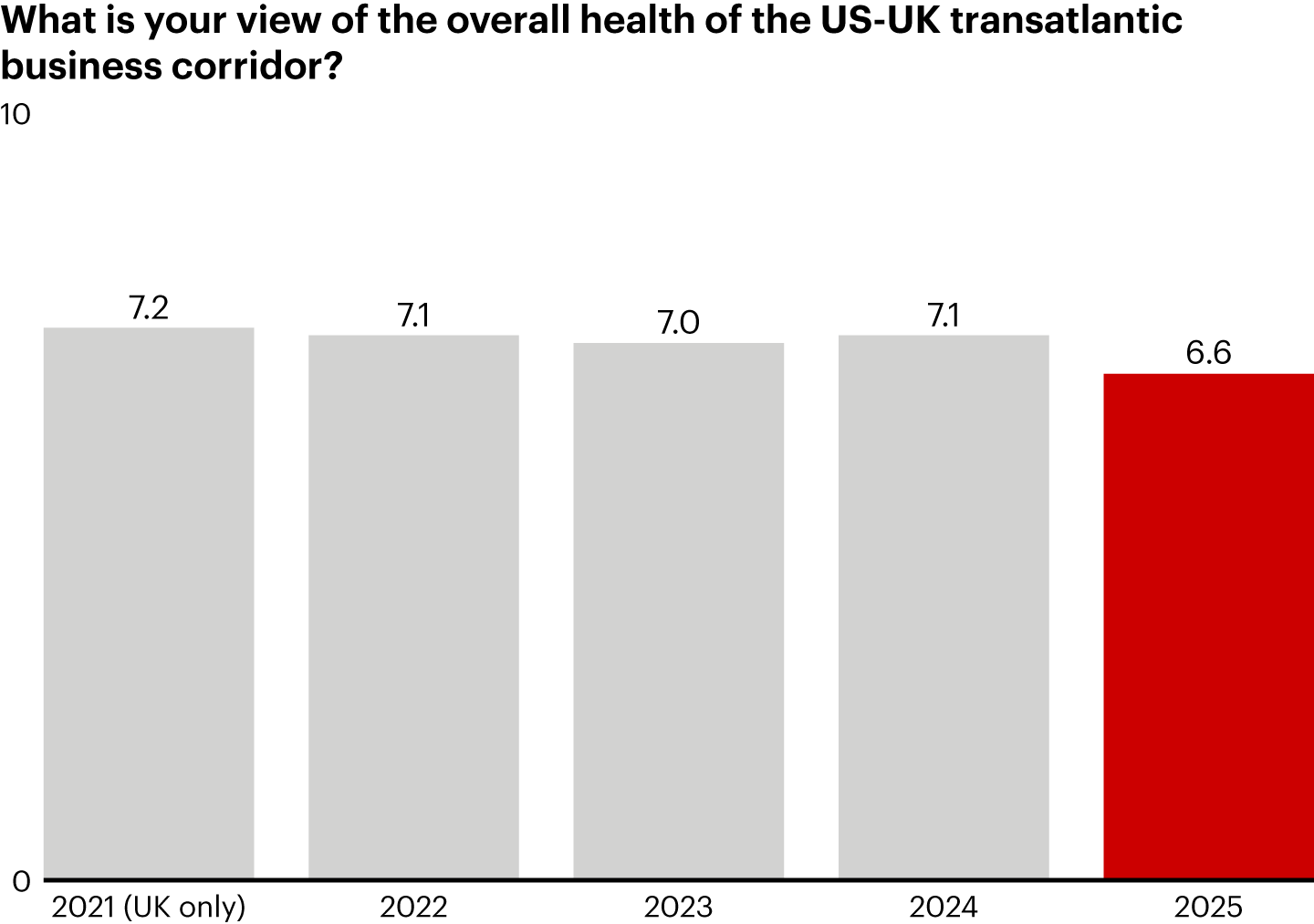

US companies report slightly lower confidence in the UK
US companies’ confidence in the UK as a place to do business slipped from 6.6 in 2024 to 6.3 this year—a fairly small decrease but the lowest confidence metric US companies have reported since our survey began five years ago (see Figure 2). It’s also below the 2023 result (6.5), which followed the market reaction to the UK’s “mini-budget” and multiple ministerial changes.
While businesses have indicated support for the principle of a pro-business growth agenda, as articulated by the UK government, the reality of higher taxes and energy costs, with the perception of onerous regulation, may underpin this decline in sentiment. It suggests that businesses are looking for further decisive reforms that strengthen political stability and translate it into a more competitive business environment. Bolder policy action on the fundamentals is needed to restore US investors’ confidence to previous levels.
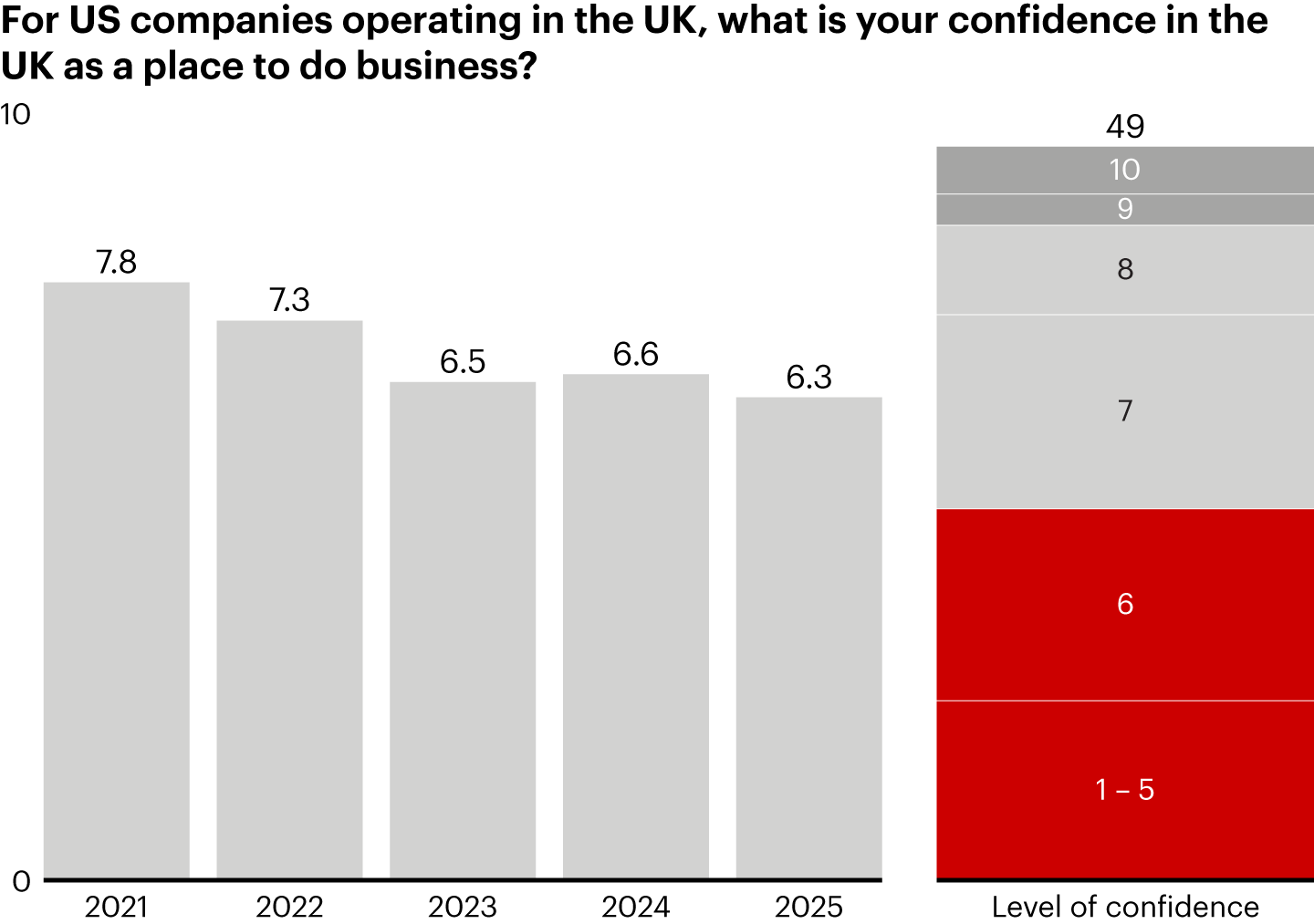

Views on the UK’s political stability jumped sharply, with net attractiveness (those citing political stability as an attractive asset of the UK minus those stating it as unattractive) rising from -16 to +37. US investors appear reassured by the UK Labour government’s large majority and the length of time before the next election. They hope this stability will enable significant reforms that increase the UK’s attractiveness for investment.
However, sentiment on the tax environment and the overall cost of doing business in the UK dropped significantly. Net attractiveness fell to -36 from an already-low base of -23. This likely reflects concerns about the UK’s future fiscal position and specific tax concerns, such as the recent increase in employer national insurance contributions.
On a brighter note, US confidence in the UK-EU relationship increased again (now for the fourth year in a row), rating 6.6 out of 10—the highest rating since Brexit. The rating also reflects big expectations: US businesses want positive and stable engagement between the UK and the EU. In this index, US investors continued to praise the UK’s skilled workforce, strong rule of law, and ongoing focus on clean and low-carbon energy solutions.
Despite the slight dip in confidence, nearly half of US respondents still plan to increase their investments in the UK, while fewer than 20% plan a decrease. However, there are clear cautionary signs.
In 2021, US confidence in the UK was high, rating 7.8. Confidence levels dropped to a moderate 6.5 in 2023, then held relatively steady before declining again this year to 6.3. The sustained slide signals that more work is needed to inspire US confidence and boost economic growth in the UK.
A majority of US companies would like the UK government to create a more business-friendly tax environment, with nearly 60% citing it in their top three priorities. Approximately 40% also named “full implementation of the new industrial strategy” as a top-three priority. US companies also want a more predictable and business-friendly regulatory environment, with two-thirds of respondents listing it as a top-three wish.
The perennial desire to further strengthen relations between the UK and the EU rounded out the list of top priorities. About one-third of US companies placed this priority in their top three (see Figure 3). This is the lowest it has ever ranked, likely because some improvement in the relationship has already been perceived.
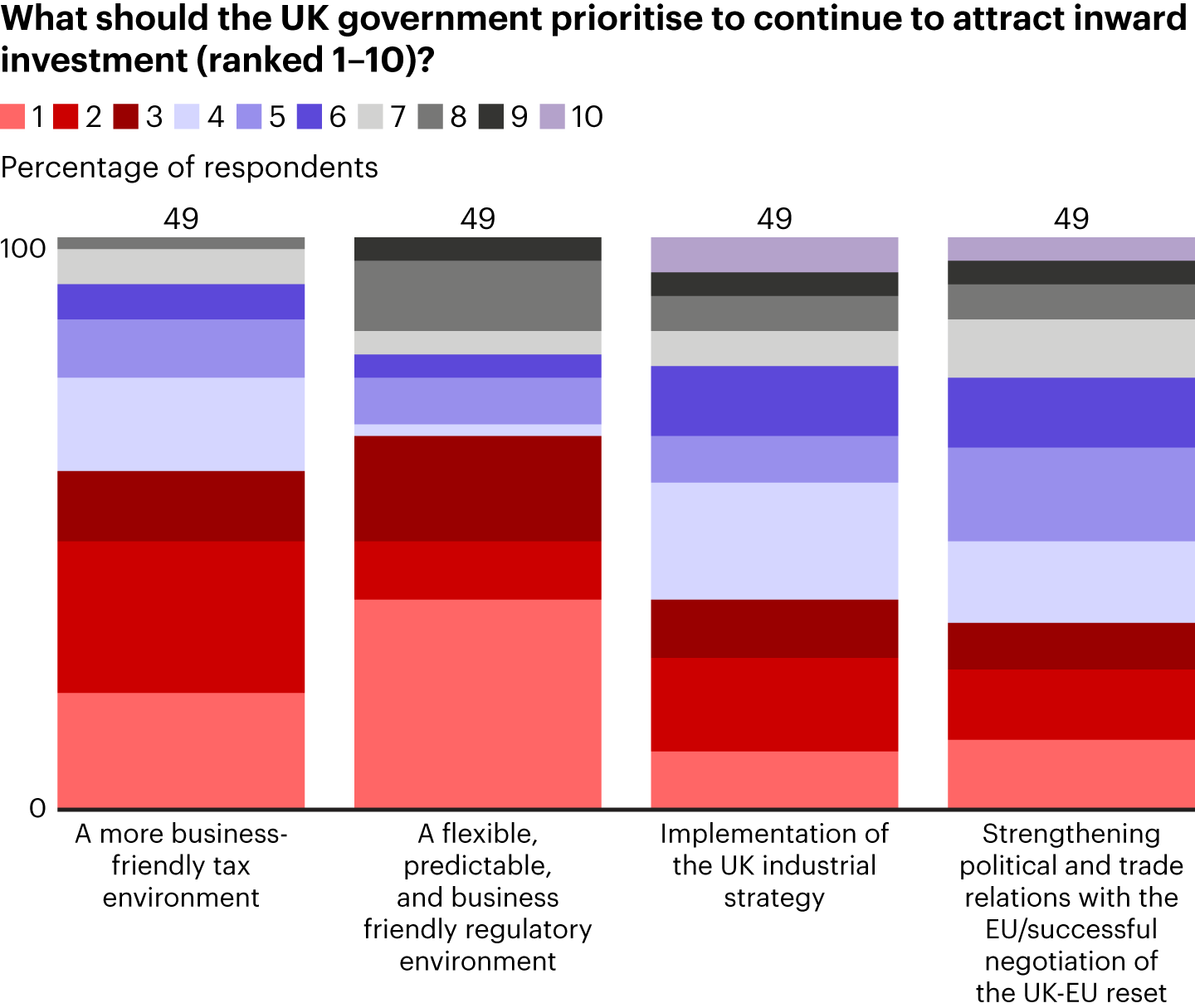

We asked US companies, “How important to your future investments in the UK is the implementation of a pro-growth agenda?” More than 80% of respondents rated its importance as a 7 or higher. This suggests that a set of priorities around tax competitiveness, regulatory flexibility, a pro-growth industrial strategy, and continued improvement in the UK-EU relationship would encourage greater US investment in the UK.
UK companies’ confidence in the US dropped significantly
UK companies’ confidence in the US as a place to do business also dropped this year, and to a more significant degree (see Figure 4). Over the past three years, confidence in the US business environment had rated highly, consistently scoring between 8.0 and 8.4. In 2025, confidence fell to 7.5.
Despite the drop, more than half of UK respondents still plan to increase their investments in the US.
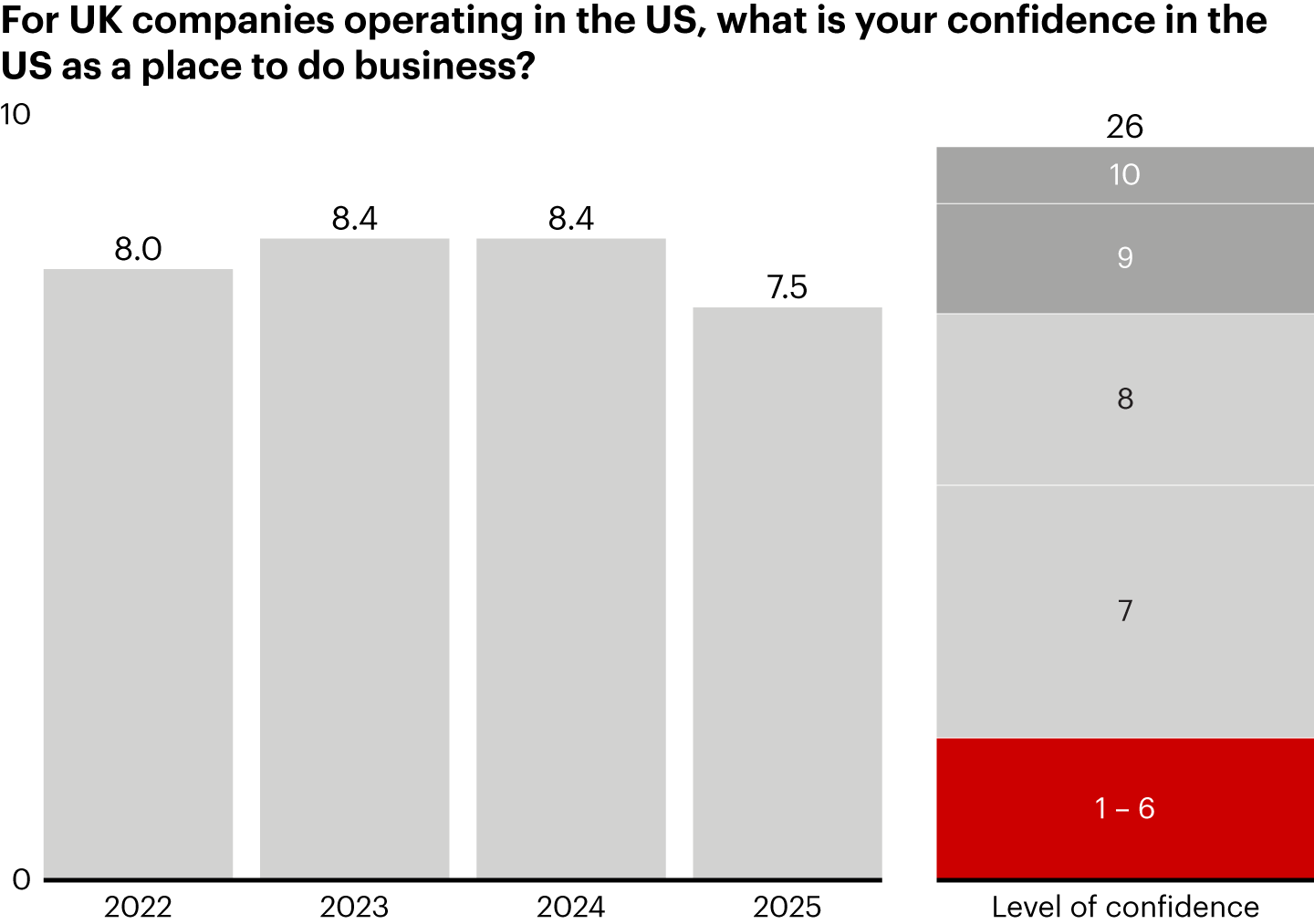

Views on the US’s capital markets and workforce remained high, with each earning +21 for net attractiveness. However, views on the rule of law slipped for the first time, flipping from an asset with +7 net attractiveness to a liability (-3). Perceptions of US political stability dropped even further: Net attractiveness fell to -21 in 2025, down from -1 in 2022.
Economic policy measures introduced by the new US administration have been substantive and rapid, prompting us to add a new question to the index this year. We asked UK companies to rate their confidence in the US’s approach to domestic and global economic policy. The average response was 5.4 out of 10, with nearly 75% of respondents giving a score of 6 or lower.
UK companies would like the US government to prioritize working with allies on trade; nearly three-quarters of respondents ranked this as a top-three priority (see Figure 5). They also want the US to keep markets open by limiting protectionism. Beyond trade, UK companies would like a predictable and business-friendly regulatory environment, with about 60% of respondents including it in their top three priorities.
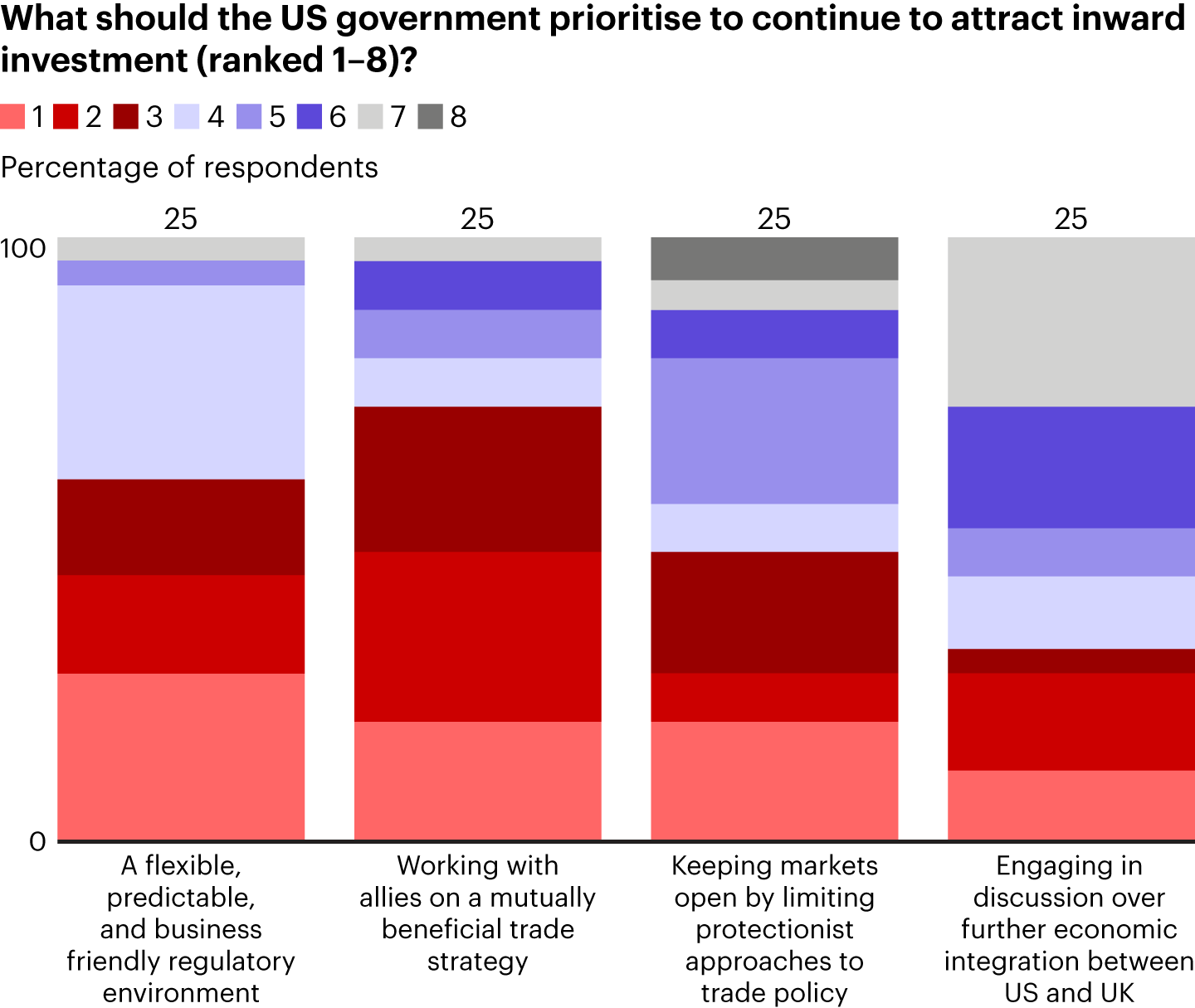

We also asked UK companies how important it is for the US to maintain strong economic collaborations with allies outside the UK, such as the EU, Mexico, and Canada. Every UK company we surveyed responded with a 7 or higher.
What is next for the US-UK corridor?
The Economic Prosperity Deal between the UK and the US, announced in May 2025, was a small but significant step toward addressing some of the recent trade issues. It left UK exporters facing higher tariffs, but in a relatively better position than other US trading partners. Companies on both sides of the Atlantic report being cautious about the deal. On average, confidence ratings were 5.7 out of 10, and more than two-thirds of respondents gave it a 6 or lower.
Respondents are mainly concerned about the deal’s limited scope and the fact that much of the detail still needs to be developed. However, they also acknowledge that it creates opportunities for further progress—for example, on US-UK cooperation on artificial intelligence (AI). About 75% of US companies and 85% of UK companies we surveyed said the US and UK should take regulatory leadership in AI.
BritishAmerican Business will be monitoring whether commitments from the deal are acted upon.
Beyond this deal, we see more opportunities to strengthen the US-UK economic corridor. Despite recent headwinds, each country retains fundamental strengths, including a resilient bilateral relationship. To unlock the corridor’s full potential, both governments should take decisive action on the priorities articulated in this year’s Transatlantic Confidence Index.
Respondents from both sides of the Atlantic have consistently called for deeper economic collaboration between the US and the UK—it’s been a recurring theme over the five years we’ve conducted this survey. Further economic integration was a top-three priority for businesses this year, cited by roughly a quarter of respondents in the US and a third in the UK. The US and UK governments can bolster this important relationship—and support the employment and investment opportunities it offers both parties.
The authors would like to thank Sophie Rahemanji, Senior Policy Manager at BritishAmerican Business, for her substantial contribution to the report. Thanks also to the many BritishAmerican Business member companies that offered their insight and expertise to make sure this report reflects what is important for leading transatlantic firms.

About BritishAmerican Business
BritishAmerican Business is the leading transatlantic trade association incorporating the British-American Chamber of Commerce in the US and the American Chamber of Commerce in the UK. We are committed to strengthening the economic corridor between the United States and the United Kingdom by supporting policies and actions that protect and enhance the environment for transatlantic trade and investment on behalf of our members. We convene and serve a growing network of companies and business leaders through networking opportunities, bespoke programming and marketing platforms. We actively promote trade and investment and support those who make the transatlantic corridor part of their business growth ambition. For more information, visit www.babinc.org.